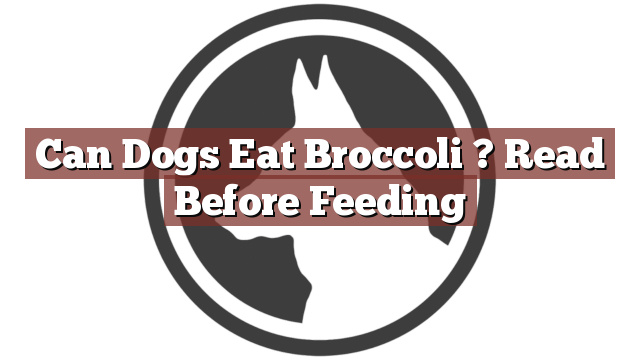Understanding Your Dog’s Dietary Needs
As a responsible pet owner, it is crucial to understand your dog’s dietary needs to ensure their overall well-being and health. Dogs require a balanced diet that consists of proteins, fats, carbohydrates, and essential vitamins and minerals. While it is tempting to share our meals with our furry friends, it is important to remember that not all human foods are safe for dogs to consume. Before introducing any new food into your dog’s diet, it is essential to research and consult with a veterinarian to ensure your dog’s safety and health.
Can Dogs Eat Broccoli? Read Before Feeding
Can dogs eat broccoli? This is a common question among pet owners who want to treat their dogs with a variety of healthy foods. The answer is yes, dogs can eat broccoli. Broccoli is a cruciferous vegetable that is packed with essential nutrients such as fiber, vitamins C and K, and folate. These nutrients can provide several health benefits to dogs, including improved digestion, immune system support, and reduced inflammation. However, before adding broccoli to your dog’s diet, there are a few important factors to consider.
Pros and Cons of Feeding Broccoli to Dogs
Feeding broccoli to your dog can have both pros and cons. On the positive side, broccoli is low in calories and contains high amounts of fiber, which can aid in digestion and help maintain a healthy weight. Additionally, the antioxidants and phytochemicals found in broccoli may help prevent certain types of cancer in dogs. Furthermore, the high vitamin C content in broccoli can support the immune system and promote overall health.
However, it is essential to exercise caution when feeding broccoli to your dog. Too much broccoli can cause digestive issues, such as gas, bloating, and even diarrhea, due to its high fiber content. Additionally, broccoli contains isothiocyanates, a compound that can be toxic to dogs in large quantities. Therefore, moderation is key when it comes to feeding broccoli to your furry friend. It is recommended to introduce small amounts of cooked or steamed broccoli into your dog’s diet and monitor their reaction closely.
Conclusion: Weighing the Benefits and Risks of Broccoli for Dogs
In conclusion, broccoli can be a healthy addition to your dog’s diet when fed in moderation. Yes, dogs can eat broccoli. It provides various nutritional benefits and can support their overall health. However, it is important to remember that every dog is different, and what may be suitable for one dog may not be suitable for another. It is always best to consult with your veterinarian before introducing any new food into your dog’s diet. By understanding your dog’s dietary needs and considering the potential benefits and risks, you can make informed decisions about their nutrition and ensure their well-being.
Thank you for taking the time to read through our exploration of [page_title]. As every dog lover knows, our furry friends have unique dietary needs and responses, often varying from one canine to another. This is why it's paramount to approach any changes in their diet with caution and knowledge.
Before introducing any new treats or making alterations to your dog's diet based on our insights, it's crucial to consult with a veterinarian about [page_title]. Their expertise ensures that the choices you make are well-suited to your particular pet's health and well-being.
Even seemingly harmless foods can sometimes lead to allergic reactions or digestive issues, which is why monitoring your dog after introducing any new food item is essential.
The content provided here on [page_title] is crafted with care, thorough research, and a genuine love for dogs. Nevertheless, it serves as a general guideline and should not be considered a substitute for professional veterinary advice.
Always prioritize the expert insights of your veterinarian, and remember that the health and happiness of your furry companion come first.
May your journey with your pet continue to be filled with joy, love, and safe culinary adventures. Happy reading, and even happier snacking for your canine friend!

